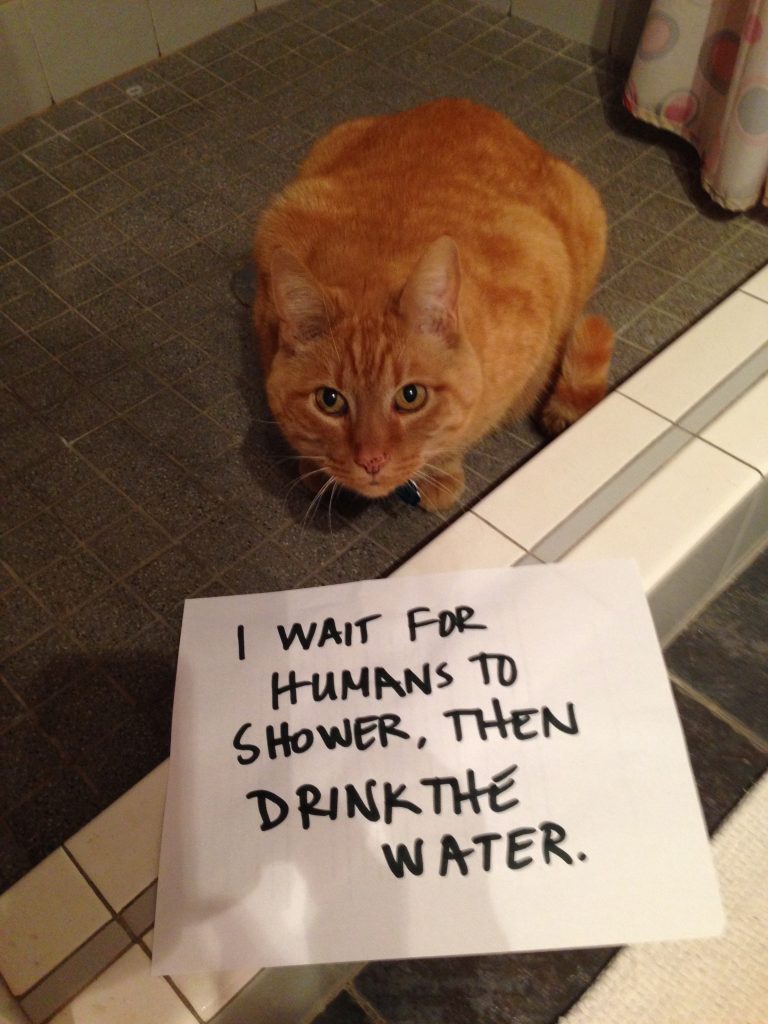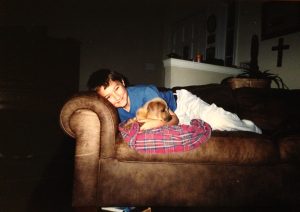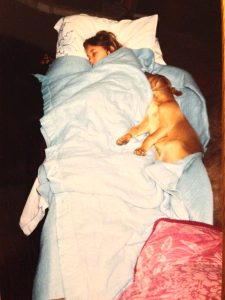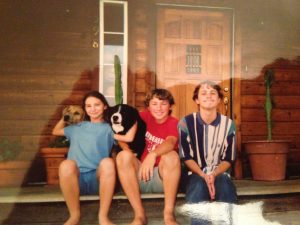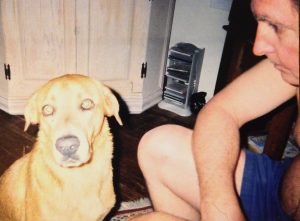love
Overheard in the Wolfe House #320
Peggy (to Sam, dressing for the wedding): Your suit is hanging in the closet.
Teresa: What shoes are you wearing?
Sam: Flip-flops.
The children are watching
Sam and I enjoy going to the movies once a month or so. We are lucky that two theaters with lounge seating are within an easy biking distance, including our newest favorite, Alamo Drafthouse.
Sam’s not a fan of action films, or films with dark themes. That includes super-hero movies, although he took a chance and really enjoyed Spider-man: Into the Spider-verse. (Best. Movie. Ever. But I digress.) We both enjoy a good story well told, which means, for starters, that we don’t miss anything by Pixar.
Recently, we went to see Peanut Butter Falcon. I knew we were taking a chance that story could come up short. Hollywood likes its tropes, and stories that include people with disabilities can be super-tropey. But the star, Zack Gottsagen, has Down syndrome and the movie’s writing and directing team had a clear, deep understanding of self-determination for people with disabilities.
The story resonated with Sam. I watched Rain Man again recently on Netflix, and Sam drifted in and out of the room as it played. Dustin Hoffman was brilliant but he doesn’t have autism – and that matters. After Peanut Butter Falcon, Sam and I talked a lot about the story and the characters. We talked some after Rain Man, but not as much as with Peanut Butter Falcon.
Then I stumbled upon another movie, Keep The Change, which features actors with autism. The story line was authentic. Sam got to see adults with autism fall in love, and I cannot tell you what a gift it is to have that on the screen.
Movies are better when our world is fully reflected on the screen. In other words, a story will come up short if the character with a disability is there primarily to challenge the protagonist’s humanity. Movies, like any media, imprint and reinforce social constructs. I’m rooting for the stories that push our humanity toward justice – and love.
How to raise a hater
Three years ago, I saw a window into how you raise a hater. It was at, of all places, the movies.
I talked with my daughter, Paige, about it. She was there. She didn’t hear what I did, but she heard something else like it. I shared my experience and insight with Shahla. She encouraged me to blog about it, but the words got stuck. A lot.
When the world is full of haters, it’s not a good place for Sam and people like him, who need us to be our best selves. People are loving and generous for the most part, but I’ve seen the dark side, too. It’s easy to feel noble and loving and generous when it doesn’t really cost you.
After a white boy drove to El Paso in order to shoot innocent people yesterday, the words finally started to flow. We talk about preparing for mass shootings in the newsroom. We know we must. There’s nothing about our community that’s special. The haters are here.
Three years ago, I watched a father teach his son how to be a hater.
Oh, it wasn’t obvious. The boy didn’t even know he was being taught to be a hater. And the father didn’t know he was teaching it, either.
To get passed down, these things have to go slow. A father loves his son and wants to be loved by his son.
A trailer played for Hidden Figures, the movie based the early days of NASA and the first flight to the moon. I sat next to the father in the movie theater. The trailer made him uncomfortable. In between stunning images of rockets blasting through space, hints of the little-told story about the pivotal role that black women played in the program unfolded. He could bear it no longer. He leaned over to his son, who was probably 8 or 9 years old, and said, “We won’t be seeing that.”
I knew why he was uncomfortable. But his son didn’t. After all the previews played, the father said, “There are lots of good movies to see.” And the son added, “But not that space movie.”
A boy loves his father and wants to be loved by his father.
We were all there to watch Moana. Did the father not know what this Polynesian legend was about? Apparently not, Paige said, because after the movie he kept asking his wife: but where did they come from?
The father had too much discomfort. A family has to find a place for the discomfort when father is afraid. The needs of the one outweigh the needs of the many. To get passed down, these things have to go slow.
Our kids will do things, learn things, seek things that make us uncomfortable. We have to let them. They will still love us. They are becoming their own. They want, and can, do like we did when we were young, and make the world a little better than it was before. If we don’t let them, they won’t be resilient enough to survive all these changes. They will become a snowflake.
Or worse.
A hater.
Fare thee well, feline
It’s been ten days since we’ve seen our cat, Tiger, although I knew the first morning when I opened the back door and he didn’t show that he was gone for good.
Tiger came to live with us as an outdoor cat. He was one of several kittens that a co-worker’s wife found in a box on the side of the road fifteen years ago. We were living on the farm at the time and had been having trouble keeping cats, as often happens out in the countryside. But Paige was 10 years old and pining for a cat, so we picked the male orange tabby kitten for good luck.
Tiger proved to be a survivor. Even as coyotes, owls and other predators exacted their toll on our farm, Tiger knew when to hold ’em and when to fold ’em. When it was time to move into town, I was apprehensive. He’d lived on the farm for more than a decade. I got advice from other cat owners and the veterinarian. On moving day, I was ready with drugs and a crate, but as soon as the moving vans showed up in the driveway, Tiger, ever the survivor, hid out. Two days later, he got hungry enough for the new owner to catch him in the house and call me.
During the transition, he fought against the drugs so it was like having a drunk college student lumbering around the house as we unpacked boxes and filled cupboards and closets and bookshelves. After a week of supervised outdoor time, he started fighting the whole cat-on-a-leash thing. I opened the door and said, “good luck little buddy.” I don’t know what I was worried about. He was a survivor and he knew where he lived. That’s where his food dish is!
Now that he’s gone, I feel the loss, as I knew I would, even though I’ve also known I won’t get any more cats. I’m a dog person. I have been since I was a girl, obsessed with learning all the breeds of dogs and reading stories about dogs and pining for a dog myself.
While our dogs have reminded me of the rewards of loving unconditionally, I have to give props to Tiger, whose utter cat-ness provided insight into life’s more complicated doings and feelings.
He brilliantly established his personal space. Pet him just a stroke or two when he wasn’t feeling it and he bit your hand or arm or leg or foot to let you know. Even when he was willing to sit for a little cuddle time, you still got bit at the end.
He ate ritualistically: every half hour or so, he returned to the bowl to eat several bites. Ergo, we learned to always pause for a moment when we opened the door to let him in (or out) and forever keep kibble in the bowl.
He often joined the dog and I on the first block of a walk. Then he decided either we weren’t worth the effort or going into the wrong territory and he went off on his own.
When Paige went off to college, the cat expressed how distressing the empty nest was by peeing all over the pricey feather bed I bought to deal with a too-hard mattress. I didn’t even try to recover anything. The feather bed got tossed in the trash. I still sleep on that too-hard bed.
Farewell, old friend. We’re glad you came to stay.
Racing alone
Another year of equestrian Special Olympics has come and gone. Sam had an off year this year, I think in part because the regional competition had to be canceled for bad weather. He and his teammates missed some of the momentum needed in competition.
Sam remained a sportsman through the disappointments. I almost thought he wasn’t feeling it – until it was time to head back home. He was sad to leave, saying that we always have fun but the competition wasn’t what he’d hoped for. Then he added that maybe next year he would only do drill.
Sam’s been branching out as a horseman this year. For many years, he only rode English. A few years ago, he added Western events. That opened the door to barrel racing, which is a barrel of fun. This year, he added carriage driving and drill.
Sam picked out the drill music first, which brings its own kind of joy for him. He and Mal, his riding coach and drill partner, did well on their short routine, especially considering how little time they had to practice. Since no one else had a routine with such challenging moves, they were competing against themselves at state Special O. They got gold.
I understood what Sam was saying. He wanted to race alone.
There’s a moving passage in architect Nader Khalili’s memoir, Racing Alone, where he explains his internal transformation, leaving a successful practice as a high-rise architect to develop prototypes for sustainable earth architecture.
Khalili tells the story of watching his son play with his friends. They have a foot race and his son, who is smaller than the other boys, falls behind and loses. Crying, the boy tells his father that he only wants to race alone. Khalili takes his son to a quiet track and watches him, full of joy, run and run.
Our children can be such magical teachers.
Odd couple
Sam traveled last weekend and the house was a little too quiet without him–a complaint he has made to me when I travel without him.
For four years now, we’ve shared a house as a funny mix of roommates/landlord-tenant, although the mother-son thing can still come into play. I don’t go in his apartment without asking, unless I need do something landlord-ish and he’s gone. We shop and try to do some fun things on the weekend, but go our separate ways socially, too. He uses the common spaces of the house like a roommate would, taking care of his own laundry and cooking. He leaves my things and my private spaces alone, which really isn’t something you worry about until you’ve had a roommate who eats your secret stash of Thin Mints and shops your closets.
When the mother-son thing does happen, I try to imagine what I would do for Michael or Paige and try not to do any more than that for Sam, except be a really good explain-i-ologist. He still needs that and always will.
He called home while he was gone this weekend. I didn’t expect the call, but my big fat grin told me how much I missed his company and I told him so. He said he missed me, too.
We’ve made a different kind of family, Sam and I. And I don’t know why, but I’m imagining filling out the census at this time next year and thinking about how we’ll be counted as one of those different kinds of families, and how important it is for all the families who have adult children with autism to get counted.
Years ago, I stumbled over a spot in one of Jill Connor Browne’s Sweet Potato Queen books where she recommends the five kinds of men you simply have to have in your life.
Where am I going with this, you ask? Please bear with me. If I had days to write you a better transition, dear Internet people, I would have. Ok with the bumpy transition, you say, so back to what you were saying about these five types of fellas …. ?
Well, the shorthand version is every gal needs a sugar daddy, a dance partner, a handyman, a lover and a soulmate. You can’t get all that in one fella, says those Sweet Potato Queens. Maybe you’ll get lucky and marry someone who ticks a lot of those boxes, but you’ll still need to set about lining up the rest of the fellas in your life one way or another.
It’s silly really, but I found it great fun to tease friends about it and a nice way to brag how Mark did pretty well with the last three. After he died, it was hard to tease about it and I can’t remember, honestly, the last time I did.
But when I think about how much Sam has grown, that funny idea creeps back in my head. Sam is definitely a handyman, almost better than Mark at this point with anything electrical or HVAC or plumbing in the house. And he’s a great dance partner; although not for me so much, because, as Dad is fond of saying, hugging family is like touching a hot stove to Sam. But we’ve two-stepped together and I’m sure we will again at the state Special Olympics dance and at Michael’s and Holly’s wedding.
And Sam is a different kind of soulmate, at least to me. I don’t know if I am to him, that’s for him to say. But he has a way of seeing the world that forces me to ask whether I’m being my best self, and in a nonjudgmental yet unyielding way that’s good for my soul.
It’s love and family, after all.
A year to be more open and connected
Two years ago, after writing a news story about a few of our clever readers and what they learned achieving their New Year’s resolutions, I did mine differently. A year into my own experiment, I had learned so much that I shared it in a column.
That first goal to not buy anything (with reasonable exceptions for food and fixing things) reinforced a simpler, more sustainable life. My next resolution, “Yes, please,” was meant to be this year’s yang to last year’s yin of “no, thank you.”
The idea wasn’t that “yes, please” was permission to give into impulses or rationalized needs, but to push through whatever had been stopping me from trying something new. How else to see the world unless you push through to the other side? I made a list of about a dozen challenges that have been nagging for years; for example, learning to better maintain my bike, sew upholstery, broaden my computer skills, speak conversationally in another language, and make cheese. But if something new crossed my doorstep, like when my friend and brilliant textile artist Carla offered a day of indigo dyeing, I said “yes.” I said yes whenever I could.
Not only is life simpler and more sustainable, but it’s also richer and more fun.
That brought the social media expression of my life into sharp relief. For the coming year, I will co-opt Facebook’s stated mission, to be more open and connected, by quitting Facebook.
The main reason to shut down my account is one that has nagged me for a long time. Facebook’s real mission is nothing like its stated mission. For example, I’ve noticed there are people you cannot reach any other way than through Facebook. I’m not saying that’s a bad thing. In Texas, we might share a lemonade on the porch and we’re cordial, but we just don’t invite everyone inside. So I would argue that when you can’t reach someone except through Facebook, then you aren’t really connected at all. Facebook is managing your relationships for you through the veneer of being “open” and “connected.”
I set up the Family Room blog as a place to explore ideas related to living with autism. It’s interesting that most readers come here via a Facebook link and will return to Facebook to comment on the topic, rather than connecting below and creating our own community–which, by the way, is not open to exploitation by a third party because I filter and delete all that garbage.
That’s Facebook’s real mission. And, they “move fast and break things.” After I watched Frontline’s two-part special, The Facebook Dilemma, I couldn’t be a part of it anymore. American newspapers are struggling because Facebook (and similar businesses) got the rules changed: they can publish with impunity while newspapers must continue to publish responsibly. It’s expensive to be a responsible company. But it’s worth it because, for one, the truth is an absolute defense. And people don’t die in Myanmar because you got so big moving fast and breaking things that you can’t clean up after yourself anymore.
It took Sam a while to accept my decision. He was worried that my exit would affect his experience. I respect that very much. People with disabilities need help living lives that are more open and connected. He finds community activities through Facebook. Because he can scroll at his own pace, he can absorb and react to more news that people share. He’s not impervious to the third-party nonsense, but he’s not going to show up at a fake rally meant to destabilize the community.
I’ll still be on Twitter because I use the platform for my job and I can’t escape it. And I know my departure from Facebook may affect my coworkers, so I will work to ameliorate that. I hope that readers who want to continue to be part of Family Room will use the green button below to bookmark the blog and come back once a month or so. This blog isn’t going away even though the Facebook teasers will.
My first objective will be to use my words to be more open and connected. Family Room will be one place to make that happen, along with all of the other ways we’ve always had to connect with each other (insert mail-telephone-plus-ruby-slippers icons here!)
My second objective will be that when I have something to share, I will share it with the person I believe would appreciate it most.
My third objective will be actively listening to others in the coming days and weeks. Because the best way to connect is to respond.
Sam taught me that.
Love people. Cook them tasty food.
Penzey’s Spices started in my home state of Wisconsin. I’m pretty sure I’ve been a customer for decades, because I remember reaching for a Penzey’s jar the first time I made so many recipes that I’ve been making for decades …
Roast chicken with lemon and rosemary …
Mexican hot chocolate with cinnamon …
Pasta with ginger and garlic …
They used to have just the one store near Milwaukee and I ordered by mail. They have shops all over the country now, but we still order online.
If your order is large enough, they’ll send you a little sample of something. For a few years, they kept sending me a spice blend, BBQ 3000. I guess maybe they thought since I lived in Texas, I would need a lot of that.
Like most Texas meat lovers, I think, I like to mix my own.
This last order, they let me know in a pop-up window what the freebie would be, and asked if it was ok. Dill weed. I clicked yes.
When the box arrived, they’d also sent a colorful bumper sticker. I didn’t put it on my truck. I put it in my front window, because it’s just such a beautiful sentiment.
Love people. Cook them tasty food.
True Blue Lacy
For the first time in 20 years, there are no dogs in my house.
Except for a very short, disastrous period with a hyper Corgi named Tippy, we didn’t have dogs when I was growing up. But I loved dogs. I studied all the different dog breeds. I read and re-read storybooks about dogs. I wanted dogs in my life.
Mark brought home our first puppy, Patch, when we moved to the farm in 1996. Part German shepherd and part chow, he grew to a gentle giant around the kids. A year or two later, a family we barely knew dumped their border collie mix at our place. We had tried once before, and failed horribly, with a rescue, so we worried about Rex. He had problems. But Mark had a good hand with dogs and slowly, but surely, Rex turned into a big, lovable lump.
As farm dogs, though, they weren’t particularly helpful. My dear friend, Terri, was having good luck with an old Texas breed, Blue Lacy, at her place in the Hill Country. She brought me her pick of the litter in January 2002.
He’d only been with us for a few weeks when Paige got the flu. He wouldn’t leave her side until she was up and about again.
Mark was a bit annoyed with me. Three dogs is a pack, he said, and they will be harder to manage. That’s ok, I told him, I want Gus to be my dog.
Gus entertained the kids as a puppy with his incredible energy. Once I sat my coffee down on the porch and he drank it as I looked away. The kids watched in wonder as he ran in circles, without stopping, for about three minutes, and then laid down and slept it off.
Mark saw that energy could — and needed to be — directed. In very little time, Gus became Mark’s dog. I did a lot of work on the farm, but Mark did more. Gus loved to work. All you had to say was “should we go do some work?” and he ran to the door with such excitement, bounding ahead of you outside. It really was his favorite time of day. With “go ahead,” he’d scout for you as you worked the fences or a row of trees, alerting you to snakes and chasing off varmints. With “get ’em up,” he rounded up the chickens and the goats when they got loose. He tried to help when other people’s livestock got on our land.
This photo is a classic shot of Mark having one of his sit-downs with a young Gus. I’m sure all that Gus heard was “blah, blah, blah” (I can’t remember what he had done wrong at this moment either), but more than anything, Gus wanted to please Mark. These little sit-downs were amazing bonding sessions.
So when Mark went to the store one night and never came home, Gus was as distraught as the rest of us. Twice he went looking for him and came home shot. Both times the veterinarian, Nub Nabors, shook his head as he looked at the x-rays. The first time Gus was shot, the bullet went clean through his chest and hit no internal organs of any kind. The second time the bullet went through the two bones of his front right leg as if threading a needle. Nub just stared at the x-ray in wonderment.
After that, Gus gave up looking for Mark.
Fast forward to life in the city, which I’ve written about before. He enjoyed these past 12 months of retirement.
Today was his last day. He got cancer and his haunches wasted away until he couldn’t hold himself up anymore. This morning, when it was time to get up and take our fake patrol in the ditch, his new favorite time of day, he gave up.
The humane thing doesn’t always feel humane.
Gus and I have been sleeping on the sofa together for nearly a year. I could sleep in my bed tonight.
But I won’t.
Random thoughts running Frenchtown Road
Michael woke me today and insisted I run with him. “It’ll be the last time,” he said.
It’s a funny way to celebrate a launching, but that’s what it was. Last year was tough for him. He had started his adult life after graduating TCU in 2013 and then had to move back home last January. I got a front row seat watching what our economy is doing to the 20-somethings. At the end of one of his worst days, I found myself offering a most grown-up salve to his wounds, pointing to the barstool in the kitchen and pouring him a generous shot of Old No. 7.
In the past year that he’s lived here with Sam and me, we often ran together. His normal pace is crazy faster than mine, but he said slowing down to run with me strengthened other muscles. True or not, it was still a nice thing to say and do — slowing a 7:00 mile to run your mom’s 10:00+
Eventually, he righted himself. Today he packed up the car and drove to his new life in Austin. 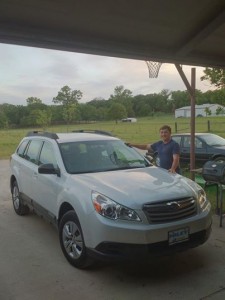
I resisted temptation to grab the camera and document the day (this photo is from one of his good days earlier this year), remembering back to Paige’s first day of kindergarten. She was the youngest, but she was feisty and she couldn’t wait to prove she was big like her brothers. When it was her turn to hop out of the car and head to her classroom for the first day of school, she did it with confidence and determination. Who was I to turn into a blubbering idiot about all my babies gone to school and ruin her first day being big for real?
So I just watched her from behind the wheel of the old Dodge Caravan and marveled at the moment.
It was icy cold today, but it was a little like that hot August day 30 years ago I drove my un-air conditioned car across the Nevada desert to Sacramento to start my grown-up life: Michael, being big for real.
